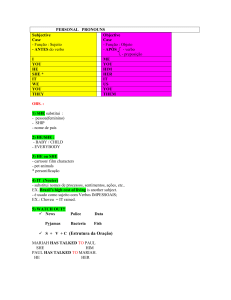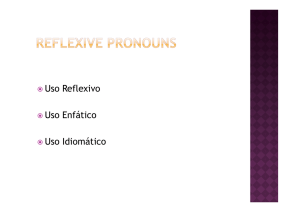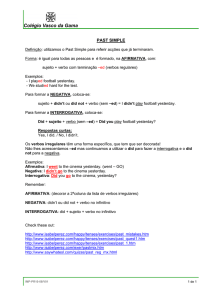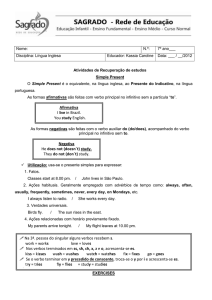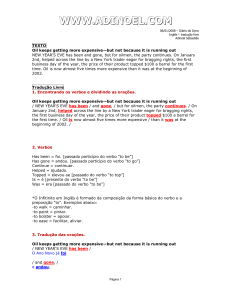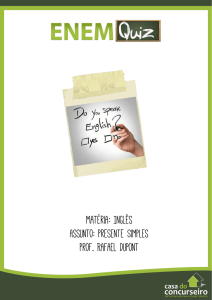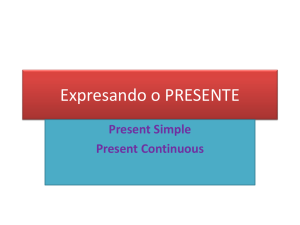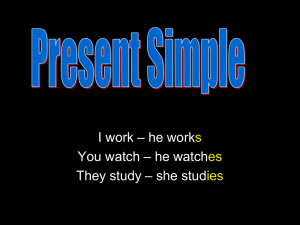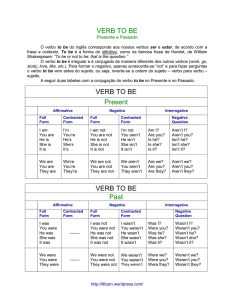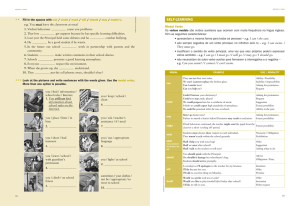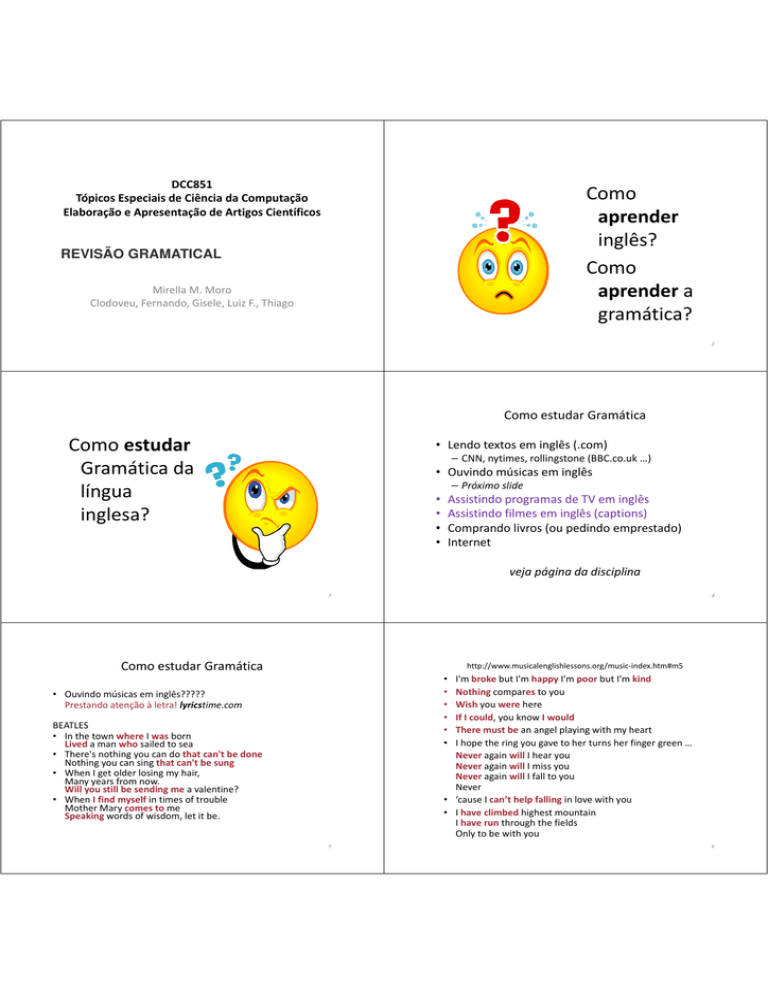
DCC851
Tópicos Especiais de Ciência da Computação
Elaboração e Apresentação de Artigos Científicos
Como
aprender
inglês?
Como
aprender a
gramática?
REVISÃO GRAMATICAL
Mirella M. Moro
Clodoveu, Fernando, Gisele, Luiz F., Thiago
2
Como estudar Gramática
Como estudar
Gramática da
língua
inglesa?
• Lendo textos em inglês (.com)
– CNN, nytimes, rollingstone (BBC.co.uk …)
• Ouvindo músicas em inglês
– Próximo slide
•
•
•
•
Assistindo programas de TV em inglês
Assistindo filmes em inglês (captions)
Comprando livros (ou pedindo emprestado)
Internet
veja página da disciplina
3
4
Como estudar Gramática
http://www.musicalenglishlessons.org/music-index.htm#m5
•
•
•
•
•
•
I'm broke but I'm happy I'm poor but I'm kind
Nothing compares to you
Wish you were here
If I could, you know I would
There must be an angel playing with my heart
I hope the ring you gave to her turns her finger green …
Never again will I hear you
Never again will I miss you
Never again will I fall to you
Never
• ‘cause I can’t help falling in love with you
• I have climbed highest mountain
I have run through the fields
Only to be with you
• Ouvindo músicas em inglês?????
Prestando atenção à letra! lyricstime.com
BEATLES
• In the town where I was born
Lived a man who sailed to sea
• There's nothing you can do that can't be done
Nothing you can sing that can't be sung
• When I get older losing my hair,
Many years from now.
Will you still be sending me a valentine?
• When I find myself in times of trouble
Mother Mary comes to me
Speaking words of wisdom, let it be.
5
6
Revisão Gramatical
Sujeito
Sujeito indispensável
TRÊS VILÕES
• Sujeito, advérbio, verbo, objeto
• Pronomes Relativos
• Concordância Verbal
Sujeito oculto, indeterminado, inexistente
IT ou THERE + BE
•
•
•
•
•
•
•
São duas horas
Choveu
Logo estará chovendo
Foram 10km de distância
Estava muito quente
Não há problema
Há muitas alternativas
•
•
•
•
•
•
•
It is 2 o’clock
It rained
Soon it will be raining
It was 150km away
It was quite hot
There is no problem
There are several
alternatives
7
8
Sujeito
Sujeito e ordem
Antes do verbo
• Aconteceu um desastre
• Apareceu uma nova solução
• A disaster has happened
• A new solution has come up
Voz passiva
• Espera-se um aumento de
desempenho
• Vendem-se livros usados
• Devem-se trancar todas as
portas
• An increase in performance is
expected
• Used books for sale
• All doors must be locked
Sujeito + verbo + objeto
Sujeito + verbo + lugar + tempo
•
•
•
I like movies
Did you see your friends yesterday?
Everybody enjoyed the party very much
•
•
•
•
Tom walks to work every morning
She has been in Canada since April
We arrived at the airport early
On Monday I’m going to Paris
9
10
Sujeito, advérbio, verbo
Pronomes Relativos
Função RESTRITIVA: necessário, identifica o substantivo
Função EXPLICATIVA: adicional, complementa o substantivo
entre vírgulas
• Advérbios no meio (entre sujeito e verbo): always, also,
probably, almost
– Tom always goes to work by car
– Your car has probably been stolen
•
•
•
•
•
The person who/that wrote that letter is gone
Mary, who/that wrote that letter, is gone
This is James, from whom we bought it
This is James, who we bought it from
We cannot sell the house to a person whose bank account is
empty
• This is the new computer, whose screen was on sale
• Come to meet me after class, when I will have time
• Se o verbo é só uma palavra, advérbio vai no meio
– I almost fell as I was going down the stairs
• Advérbio sempre depois de am, is, are, was, were
– You’re never on time
• Se o verbo tem mais de uma palavra, o advérbio vai depois
do primeiro verbo
– I can never remember his name
– Ann doesn’t usually smoke
11
12
Pronomes Relativos
Pronomes Relativos
• Pessoa
WHO
verbo
• Pessoa
WHOM não verbo
• Animal/objeto WHICH verbo
• Animal/objeto WHICH pronome
• Animal/objeto WHICH nome
• Substantivo
WHOSE substantivo
• Local
WHERE informação
• Tempo/Data WHEN
informação
THAT = WHO, WHOM, WHICH
• That: quem, quem, o qual, os quais
– Pessoas, situações, seres inanimados
• Who/Whom: quem, o qual, os quais
– Pessoas
• Which: que, o qual, os quais, no qual, do qual
– Situações, seres inanimados
• Whose: cujo, do qual, dos quais – posses
• Where: no qual, onde – lugar
• When: quando – tempo
13
14
Pronomes Relativos
Concordância Verbal
• Pronomes indefinidos no singular
• WHOM, WHICH = objetos de preposição, devem
vir depois dela
–
–
–
–
–
– The solution about which we disagreed will finally be
implemented
– The solution that we disagreed about will finally be
implemented
• Situação sempre requer WHICH
Each, another, either, neither, little, much
Pronomes iniciados por any, no, some, every
Little is happening because neither of them is here
Everybody is coming, but no one is drinking wine
Each student is responsible for his homework
• Verbo concorda com substantivo mais próximo
– Nobody replied to our email, which is really strange
• Pronome pode ser omitido quando existe sujeito
– The project (that) you were talking about was rejected
– Either/or, neither/nor
– Neither the letter nor the email is ready
– Either Mary or her children are ready
15
Concordância Verbal
MATERIAL EXTRA
• Pronomes indefinidos no plural
• NAPÁGINA
– Both, several, few, many, most, others
– Both Mary and John are good students
– Several algorithms perform better than this one
– English Grammar Cheat Sheet – Revisão de Preposições, Phrasal Verbs,
Conjunções PDF Exercícios – Guide to Grammar and Style, Jack Lynch
• Pronomes indefinidos com sentido singular e
plural, dependendo do substantivo a que se referem
–
–
–
–
–
16
Any, more, some, enough, all, most, who, half, none
All the orders have been processed
All equipment needs updating
Most of the computers are on that room
Most of the staff wants a raise
17
18
MATERIAL EXTRA
MATERIAL EXTRA
Revisão de Preposições, Phrasal Verbs, Conjunções
• Prepositions
–
–
–
–
–
English Grammar Cheat Sheet
–
–
–
–
–
–
–
–
–
–
–
–
–
–
–
–
–
A, An, The
Pronomes relativos
Quantitativo (much, less…)
Frases condicionais (if)
Graus de adjetivos
Concordância verbal
Gerúndio
Infinitivo
Such, other(s)
At, On, In
There to be
Modais
Conjunções
Plural
Similar sound, different words
Apostrophe confusions
Common mistakes
•
The meaning of prepositions
EXERCÍCIOS
Prepositions used in idioms
COM RESPOSTAS
Nouns followed by prepositions
Adjectives and verbs in the passive voice followed by prepositions
Verbs followed by prepositions
Phrasal verbs
–
–
–
–
Consisting of a verb followed by a preposition
Consisting of a verb followed by an adverb
Distinguishing between verbs followed by prepositions and verbs followed by adverbs
Consisting of a verb followed by a word which may function either as an adverb or as a
preposition
– consisting of a verb followed by an adverb followed by a preposition
•
Conjunctions
–
–
–
–
–
19
Coordinate conjunctions
Correlative conjunctions
Subordinate conjunctions
Connecting adverbs
Parallel construction
20

